Opinion
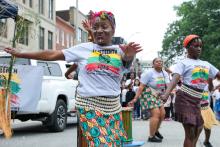
This week, the staff at Sojourners will have some well-deserved additional time off as we pause on Thursday to observe Juneteenth. I want to share why we do this — and why I hope other American Christians will join us in honoring this day as part of our shared call to justice.
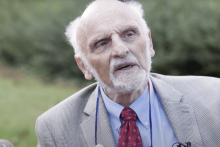
It would be impossible for me to overstate the profound impact that Brueggemann had on justice-oriented Christians. Not only did he write more than 100 influential books of theology and biblical criticism over the course of his long career, he also wrote dozens of articles for Sojourners. There are very few theologians I can think of who taught me as much as Brueggemann did about how to read the Bible and what a deepened understanding of scripture reveals about God’s heart for justice and our ability to imagine a world beyond empire.

Walking down a road paved with churches, I approach a large building whose bright orange awning beckons me from down the block. The establishment, Sea Town Fish & Meat Market, is staffed by neighborly workers who call me bebecita when I ask them to weigh my tilapia and salmon. I am there on yet another Friday morning to pick up fresh fish for one of my Lenten devotions: eating fish on Fridays.

Over a grainy international phone call, I could hear people singing at St. Peter’s Square as I spoke with BBC journalist Mark Lowen about Pope Francis. It was April 21, and I, along with two other queer Catholic advocates, Max Kuzma and Simon Fung, were reflecting on what Francis had meant for each of us and our hopes for the future of the Catholic Church.
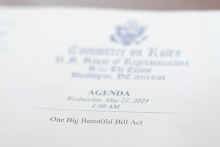
This bill, which passed the Republican-controlled House of Representatives on a party-line vote, serves as a thermometer — and the reading we’re getting back is telling us that the United States of America is suffering from a dangerous fever.

On April 16, 2025, the Supreme Court of the United Kingdom passed a ruling that the legal definition of a woman excludes transgender women in some cases. This came after the campaign group For Women Scotland fought to oppose sex-based protections for anyone not assigned female at birth. The group’s agenda had focused on the Scottish government’s interpretation of The Equality Act of 2010, which provides protections against discrimination. This ruling does not prevent trans people’s protection from discrimination as trans people, but it does reinforce the idea of a strict binary for gender.

I went on a trip to the American South with the Telos Group, a nonprofit dedicated to equipping people to advocate for peace and reconciliation amid conflict. The purpose of the delegation was to help Palestinians learn about the histories and current realities of the Black and Indigenous struggle for justice in the United States.

One of the more alarming aspects of the Trump administration is the way it seeks to instrumentalize Christianity — both as a weapon against its political opponents and to reward its political supporters.

On May 15, Palestinians around the world will mark Nakba Day to remember the catastrophic events of Palestinian mass displacement. In years past, this day has largely flown under the radar. But this year feels different. After the atrocities committed by Hamas on Oct. 7, 2023, and in the wake of the state of Israel’s mass killing of Palestinian men, women, and children along with the staggering destruction of Gaza, the world can no longer look away. The question now is whether it will summon the courage to act.

Since graduating, I’ve largely tried to ignore all things related to Cornerstone. Whenever I would hear news about the school — whether it involved limiting intellectual freedom, disassembling the humanities department, or dismissing employees deemed to be insufficiently conservative or supportive of the president — it only served to confirm my ignorance-is-bliss approach. For a long time, whenever I was confronted with the fact that Cornerstone had only become more restrictive since I graduated, what came to mind was the first half of a quote from the writer James Baldwin: “Not everything that is faced can be changed …”

On Wednesday of Holy Week, while most Christians were preparing to proclaim the Resurrection of Christ, Health and Human Services Secretary Robert F. Kennedy Jr. made a proclamation of a different kind: “Autism destroys families.” He went on to say that autistic children “will never pay taxes, they’ll never hold a job, they’ll never play baseball, they’ll never write a poem, they’ll never go out on a date, many of them will never use a toilet unassisted … ”
These remarks framing autism as an epidemic or tragedy were not simply a one-off. They are both part of and an escalation in the broader Trump administration position that accessibility — the “A” in DEIA — is a problem to be eliminated, a mindset that results in policies that are at least unfriendly, if not actively hostile, to disabled people like me.

There’s been plenty of coverage of what Trump and his administration have done in their first 100 days. In the conservative media ecosystem, this coverage appears as disinformation-riddled praise for how Trump has restored America’s greatness and created renewed prosperity. In mainstream media outlets, this coverage is often focused on cataloguing the harms of policies that often felt chaotic or cruel. And while I’m grateful for those who ensure the public has an accurate understanding of the impact of Trump’s decisions, there’s another set of stories beneath those headlines that rarely get as much attention: how people have consistently been taking courageous action to counter these harms.

Pope Francis will be remembered as a champion for the vulnerable. The outpouring of praise from global leaders shows a near universal appreciation for his voice for justice.
Former President Joe Biden marked Francis’ death in a statement, saying the pope “commanded us to fight for peace and protect our planet from a climate crisis. He advocated for the voiceless and powerless.” President Donald Trump ordered flags to be flown at half-staff in the pope’s honor. Several other leaders in the U.S. and around the world also took time to honor Francis.
But you can’t have a voice for justice without boldly denouncing injustice, and Francis was brave enough to do so. Recalling Francis’ simplicity and humility, we must avoid the risk of erasing his courage and audacity, letting the powerful — all too keen to praise a pope whose advice they routinely ignored — off the hook in the process.
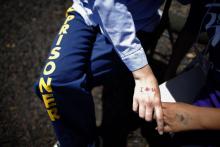
At Lane Murray, where I’m incarcerated, a bureaucratic rule creates a peculiar dilemma for someone like me who finds truth and solace in both Christianity and Buddhism. The prison system demands I choose just one, but my soul refuses to be so neatly categorized. We’re also only allowed to change our religious affiliation once every six months. As if divine inspiration could ever follow an administrative calendar.

The pope’s final months have felt to me like the times when my grandparents were at the end of their lives. We waited for updates from the doctors. We waited with dread for the phone call — or in this case, breaking news emails and social media posts — to bring the final news. There were moments of hope, including Pope Francis emerging from the hospital and appearing in St. Peter’s Square. But we knew that at some point, we’d be facing the loss of someone we loved.
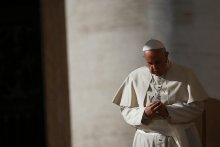
Francis’ attempts at reforming the church often clashed with Catholicism’s growing right wing and failed to stop the flood of Catholics abandoning the church. It takes time to turn a 2,000-year-old church around, and ultimately, Francis’ papacy would be a complicated one, marred by the damage done in the church’s past, even as he tried to guide it forward into an unclear and troubling future. But like his namesake saint, he always put being a pastor first.

When Pope Francis’ condition first began to worsen in February, I found myself suddenly feeling the kind of vertiginous paradigm shift usually reserved for the loss of close family or friends, that sense of a curtain being torn aside and a truth being revealed. The detail that really broke me was the news that as he had gotten sicker, Francis continued to text and call the people of Holy Family Parish in Gaza. It was so far beyond what anyone would expect of a critically ill 88-year-old man. And yet it crystallized for me what has been so personally important about Pope Francis: his dedication to welcoming those on the margins.

At some point this Easter Weekend, Christians will be reflecting on the final words that Jesus spoke from the cross, sometimes referred to as the seven last words of Jesus.
When I was younger, I was convinced that System of a Down’s “Chop Suey!” was a Christian song because lead vocalist and lyricist Serj Tankian incorporated Jesus’ final declarations into the song. But dissimilar to the order that Christians have typically arranged Jesus’ final words, the song first quotes the cry of reunion and then climaxes with the cry of dereliction.
Considering that the Roman Empire believed Jesus was a terrorist and crucified him as one, emphasizing the cry of dereliction seems apt.
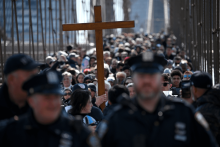
Reading these passages today, Jesus’ trial is a striking example of the interplay between the political power brokers who condemn Jesus to death and the crowds who cried out to Jesus days earlier for deliverance. While Pilate is responsible, he uses the crowd’s actions as cover, absolving himself of responsibility for deciding Jesus’ fate. Reading this story amid the deeply concerning judicial drama playing out in real time between the Trump administration and courts, I’m reminded of the role we all can play when we collectively act — or fail to act — in support of justice.

“The problem with the meritocracy ... [is that it] leeches all the empathy out of your society.”
The right-wing political commentator Tucker Carlson said that back in 2017 and, by my lights, there’s a kernel of truth there. It almost echoes the early 20th-century sociologist Max Weber’s critique of the Protestant work ethic, how Americans are trained to see wealth as a just reward for living a good life and poverty as punishment for living a bad one; an economic spin on Calvinism. Even if you think Carlson is a reactionary grifter (which I do), I think he’s onto something here.